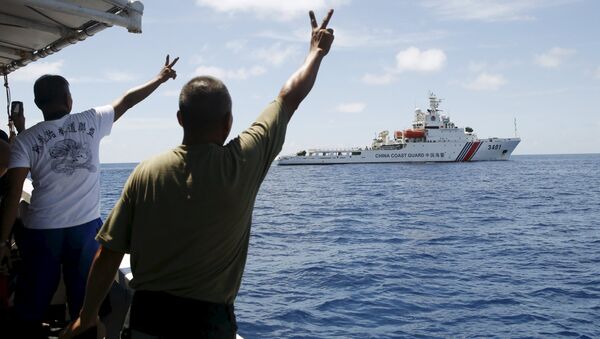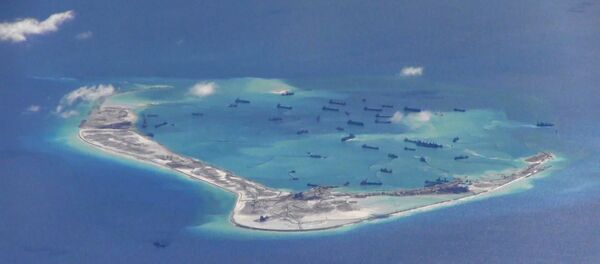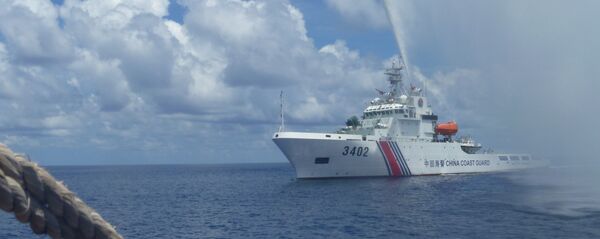A major geopolitical game between China and the United States is going on in the South China Sea. Regardless of some dire forecasts that the award issued by the Permanent Court of Arbitration (PCA) in The Hague on the South China Sea would prompt China's overreacting, Beijing has not fallen into the trap.
Quite the contrary, China has signaled that it will address the South China Sea issue through diplomatic means.
"Under no circumstance will the arbitration award exert any impact on China's territorial sovereignty and maritime rights and interests in the South China Sea," Chinese Premier Li Keqiang stressed last Saturday at the 11th Asian-Europe Meeting (ASEM) Summit, as quoted by Xinhua.
In response to the ruling Beijing has launched a diplomatic charm offensive.
"Only a volatile South China Sea would threaten regional peace and stability. Our 'friends circle' on the South China Sea issue seems to be getting bigger and bigger," an unnamed Chinese diplomat told Xinhua on condition of anonymity.
Commenting on the issue, Xuan Loc Doan, a research fellow at the Global Policy Institute of London Metropolitan University, calls attention to the fact that the 11th ASEM "did not directly mention the South China Sea dispute in its closing statement."
He also notes that the European Union (EU) released its statement on the South China Sea ruling almost three days after the PCA issued its award.
"Moreover, this declaration made by Federica Mogherini, the EU's High Representative, on behalf of the 28-member bloc, did not directly name China," he points out in his article for Asia Times, adding that Brussels failed to issue an "immediate" and "more strongly-worded" statement because it was reportedly blocked by Croatia, Hungary and Greece.
But that is half the story. Following The Hague ruling the Association of Southeast Asian Nations (ASEAN) completely failed to issue any statement on the PCA award, Xuan stressed, citing a lack of consensus among the bloc's members.
It is especially interesting in the context of Washington's repeated attempts to use ASEAN as a bulwark against China in the Asia-Pacific region.
As US geopolitical analyst Eric Draitser noted in his February interview with Sputnik, ASEAN appears to be a "tool" that the US uses to project its economic and military power in the region.
Thus, unsurprisingly, Scott Harold, associate director for the US influential RAND Corp. has recently expressed his concerns regarding China's increasing influence within ASEAN in his interview with Voice of America.
However, the situation is not as easy as it seems.
Narushige Michishita, Assistant Professor of the Security and International Studies Program at the National Graduate Institute for Policy Studies (GRIPS) in Tokyo, notes that The Hague ruling is a double-edged sword for China's neighbors.
The crux of the matter is that The Hague not only rejected China's "historic rights" in the South China Sea, but also ruled that the disputed Spratly Islands are technically "rocks" and could not be entitled to 200-nautical-mile exclusive economic zones (EEZs).
"According to the arbitral tribunal, Taiwan's Taiping Island is technically a "rock", meaning that it cannot generate an EEZ. Indeed, many countries in the region may now find themselves in an uncomfortable position, including Japan, with regard to its Okinotorishima and Takeshima islands. If taken to court, these "islands" might be demoted to "rocks" without EEZs," the professor explained.
So far, countries of the region may decide to remain mute on disputed islands instead of seeking arbitration and demanding to enact The Hague ruling, "out of fear that the court might redefine their islands as rocks," Michishita underscored.
Meanwhile, Xinhua reported Saturday that Philippine President Rodrigo Duterte "has expressed belief that the Philippines could get more benefits from China if the two countries could reach a settlement despite the recent ruling of the arbitral tribunal on the South China Sea issue."
"On the (South) China Sea, if we can just have a settlement with them despite the arbitral judgment, I think we will get more benefits," Duterte said as quoted by the media outlet.
As of yet it seems that Beijing's realpolitik has prevailed in the US-China geopolitical game over the South China Sea.





